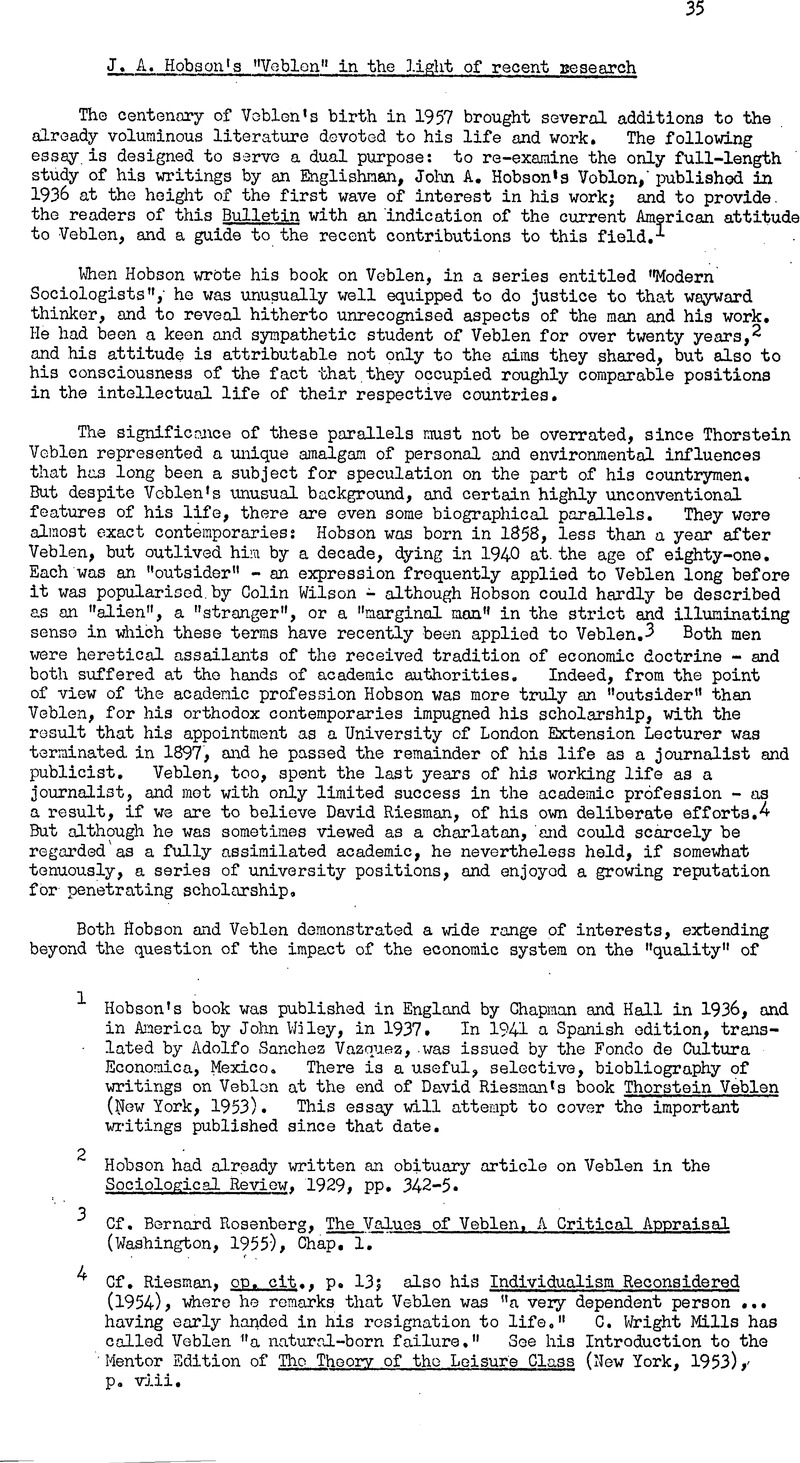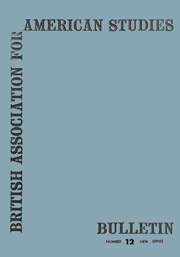No CrossRef data available.
Article contents
J. A. Hobson's “Veblen” in the light of recent research
Published online by Cambridge University Press: 17 February 2011
Abstract

- Type
- Revaluations, IV: J. A. Hobson, “Veblen”
- Information
- Copyright
- Copyright © British Association for American Studies 1959
References
page 35 note 1 Hobson's book was published in England by Chapman and Hall in 1936, and in America by John Wiley, in 1937. In 1941 a Spanish edition, translated by Adolfo Sanchez Vazquez, was issued by the Fondo de Cultura Economica, Mexico. There is a useful, selective, biobliography of writings on Veblon at the end of David Riesman's book Thorstein Veblen (New York, 1953). This essay will attempt to cover the important writings published since that date.
page 35 note 2 Hobson had already written an obituary article on Veblen in the Sociological Review. 1929, pp. 342–5.
page 35 note 3 Cf. Rosenberg, Bernard, The Values of Veblen, A Critical Appraisal (Washington, 1955)Google Scholar, Chap. 1.
page 35 note 4 Cf. Riesman, op. cit., p. 13; also his Individualism Reconsidered (1954), where he remarks that Veblen was “a very dependent person … having early handed in his resignation to life,” C. Wright Mills has called Veblen “a natural-born failure.” See his Introduction to the Mentor Edition of The Theory of the Leisure Class (New York, 1953), p, viii.Google Scholar
page 36 note 1 Hobson, Veblen, pp. 35–7. This view has recently been endorsed by Dobriensky, Lev E. in his Veblenism, A New Critique (Washington, 1957), p. 170.Google Scholar
page 36 note 2 Thorstein Veblen and His America (New York, 1934).Google Scholar Despite certain imperfections in this volume, all subsequent writers on Veblen have acknowledged their great indebtedness to it.
page 36 note 3 Homan, Paul T., Contemporary Economic Thought (New York, 1928)Google Scholar, Chap. III; Teggart, Richard V., Thorstein Veblen; A Chapter in American Thought (California, 1932).Google Scholar
page 37 note 1 Bernard Rosenberg has recently argued that this volume should be rescued from its customary neglect, and raised to a position of “decisive importance” in Veblen's scheme of thought, op. cit., p. 9.
page 37 note 2 Cf. Gruchy, Allan G., Modern Economic Thought, The American Contribution (New York, 1947), p. 127.Google Scholar
page 37 note 3 As an extreme example of this feeling we may cite Arthur K. Davis's assertion that “in proportion as Veblen transcended his habit-instinct orientation, his work gained insight,” See his “Sociological Elements in Veblen's Economic Theory”, The Journal of Political Economy, 1945, p. 144.
page 37 note 4 Davis, Arthur K., “Thorstein Veblen Reconsidered”, Science and Society, Winter 1957, p. 70.Google Scholar There are marked changes between this article and the one quoted above, especially the increased emphasis on the links between Veblen and Marx. For a valuable and unduly neglected treatment of Veblen's psychology see Schneider, Louis. The Freudian Psychology and Veblen's Social Theory (New York, 1948).Google Scholar
page 37 note 5 Teggart, op. cit., p. 86.
page 37 note 6 The slow recognition of Veblen's position by his friends is suggested by R. G. Tugwell's remark in the New Republic, March 29, 1939, p. 218: “that Veblen was subversive, not merely ironical, did not become clear to anyone for some time. Eventually he was found out.”
page 38 note 1 “Veblen believed that perpetual peace and capitalism are incompatible”, Davis, “Thorstein Veblen Reconsidered”, op. cit., p. 79.
page 38 note 2 Cf. Essays in our Changing Order, 1934, p. 218.
page 38 note 3 Noble, D. W., “Dreiser and Veblen: The Literature of Gultural Change”, Social Research, Autumn 1957, p. 319.Google Scholar See also his recent book, The Paradox of Progressive Thought (1958), which is concerned with the pre-1920 period.
page 38 note 4 Earlier commentators attributed Veblen's “Olympian satire” to his detachment from contemporary society; only recently has Dorfman's hint that this may have been a device for hiding feelings too deep to admit of easy expression boen elaborated by David Riesman, Veblen, op. cit., p. 14 ff. Riesman's brilliant, psychoanalytical reconstruction of Veblen's character epitomises the recent tendency to reduce Veblen to life-size proportions.
page 39 note 1 For example Dobriansky, op. cit., especially Chap. VIII.
page 39 note 2 Davis, op. cit., p. 82; Dobriansky, op. cit., pp. 173–9. Another recent writer to emphasise Veblen's Marxist leanings is Lewis Feuer, “Thorstein Veblen: The Metaphysics of the Interned Immigrant”, American Quarterly, Summer, 1953.
page 39 note 3 Rosenberg, op. cit., pp. 53, 105.
page 40 note 1 Lerner, Ideas are Weapons, 1939, p. 133; Commager, The American Mind, 1950, p. 238.
page 40 note 2 Dobriansky, op. cit., p. 96 ff.; also A. W. Coats, “The Influence of Veblen's Methodology”, Journal of Political Economy, 1954.
page 40 note 3 Cf. D. R. Fusfeld, The Economic Thought of Franklin Delano Roosevelt and the Origins of the New Deal (1956).
page 40 note 4 Arnold A. Rogow, “Veblen and the Society of Consent”, Nation, August 31, 1957; American Economic Review Supplement, May 1958, p. 1. See also the May 1958 Supplement, p. 1, for “A New Look at Institutionalism” by Kenneth Boulding.




